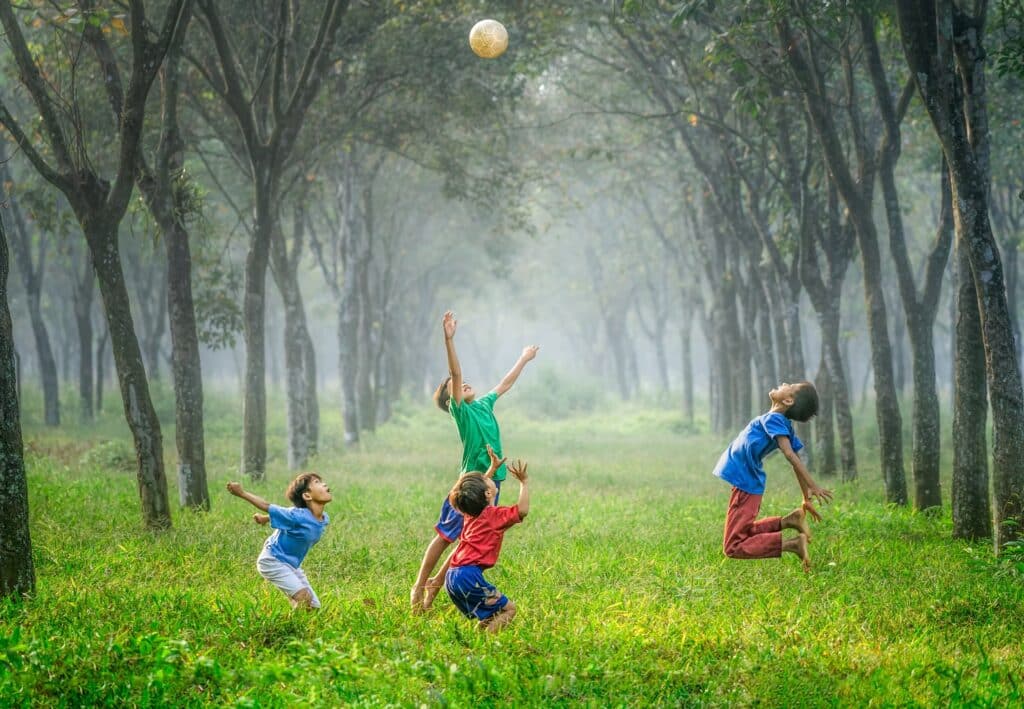Participating in groups, or collaborative learning, can have a lot of positive effects on your child’s development. Collaborative learning refers to when your child learns in a small group through different structured and unstructured activities. Learning in a group setting plays a huge role in peer interaction, building communication and social skills, turn-taking, and so much more!
Stages of Play:
Solitary Play: Ages Birth-2 years
Also known as independent play. The child plays by themselves and doesn’t intend to play with anyone else.
Spectator Play: Ages 2 years
Also known as onlooker play. The child watches other children play but does not engage in play themselves. This play level develops a child’s awareness and attention skills.
Parallel Play: Ages 2+ years
Children play side by side, but there is no organizational structure. The child will play next to another child, but they will not play with the other child.
Associative Play: Ages 3-4 years
This level has no organizational structure. The child will still play independently, but they will begin to share toys that they are playing with. There is no direct communication between them other than sharing toys.
Cooperative Play: Ages 4+
Play is organized. The children are playing together, sharing toys, and communicating with one another. The children will participate in highly structured play activities and will involve themselves in group games.
Interaction
By participating in groups, your child will be encouraged to play and interact with peers they normally wouldn’t play with, which can improve inclusivity. Groups can also help your child to step out of their comfort zone and form new friendships, which can help encourage them to work with others and see their point of view.
Social Skills
Every child is unique, some may be social butterflies and others might prefer to keep to themselves, both of which are great. Around ages 1-3, children develop social skills at their own pace. Around ages 3-5, children begin to fully interact with their peers. At this time, children learn all about social boundaries, which is an important skill to have through adulthood.
Communication Skills
Cooperative play in a group setting further enhances communication, and your child will be able to learn from their peers. Through play, your child will practice language skills that will expand their vocabulary. They will engage in conversations from a wide range of topics that will help to enhance their cognitive development.
Cognitive Skills
Your child will, without a doubt, expand upon their cognitive skills in a group setting. While playing with others, they will learn how to sort, sequence, search, remember, match, build, write, and so much more. Your child can learn these skills by simply observing their peers in a group setting, and practice trying it out for themselves.
Imagination/ Creativity/ Role-Playing
When joining a play group, the environment is set up to encourage play and creativity in an unstructured way. Some will play doctor to care for others, others will pretend to be an astronaut in outer space, play dress up, teach a class, or buy and sell items from a grocery store. Role playing allows your child to prepare for real life situations which can also help build problem solving skills. Children develop 80% percent of their brain in their first three years of life, so it’s important for them to spark creativity and imagination during this time.
Turn-Taking
By working in a group setting, your child will learn to be considerate and cooperate with others, especially when it comes to sharing. They will learn to work toward a common goal and doing so will help strengthen their communication skills to come up with a solution.
Conflict Resolution
Conflict resolution is an important skill to develop and grow from an early age. Encompassed in solving conflicts includes listening to their peers, social and emotional awareness of others’ feelings, teamwork, and thinking creatively to come up with a solution. It is important for a child to learn how to resolve conflicts on their own before asking for an adults’ help—although it is perfectly okay if they need some help along the way.
Direction Following
While working in a group setting, there will often be many opportunities for learning how to follow directions. Your child will learn specific cues such as “first this, then this” to help with direction following. For example, they will need to first wash hands, then eat snack. There are also opportunities to learn direction following through games. Examples include Simon Says, Freeze Dance, Red Light Green Light 123, and making crafts.
Emotional Confidence
Around ages 2-5, your child will begin to be more independent. They will step out of the comfort of their home environment and close family members. When a child leaves to join a learning group with new friends and teachers, separation from their caregiver is put to the test. Your child will build their confidence and their sense of independency from this early age.
Fine Motor Skills
Participating in a group can help to improve fine motor skills through different activities, which involves using the small muscles in the fingers and wrists to make movements to complete daily tasks. Group activities, particularly in preschool, can include handwriting tasks such as learning how to write the letters in the alphabet and numbers. Other group activities can include arts and crafts that focus on coloring, scissor skills, and other activities to improve fine motor precision and integration. Fine motor skills can even further develop by assembling puzzles and playing with toys.
Gross Motor Skills
Joining a group can help to promote physical activity, such as running, jumping, twirling, skipping, hopping, and more. Your child won’t even realize they’re strengthening their muscles, bilateral coordination, motor planning, and other gross motor skills, because they’ll be having too much fun playing and learning.
Amy Leggio, OTS
References
https://blog.himama.com/why-preschool-small-group-activities-are-important/
https://www.playgroupnsw.org.au/ParentResources/EarlyChildhoodDevelopment/5-benefits-playgroup
https://www.authorsden.com/visit/viewarticle.asp?AuthorID=97940
https://pathways.org/kids-learn-play-6-stages-play-development/

